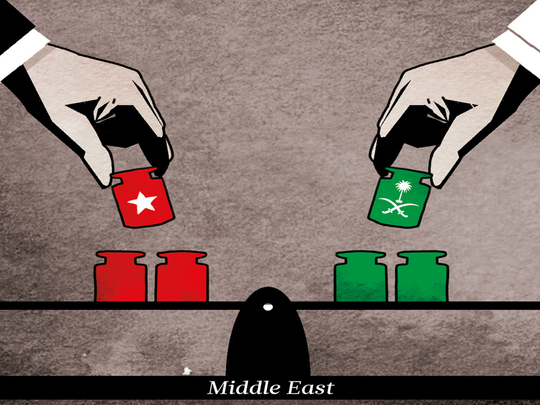
Although the Saudi Heir to the Heir Apparent, Prince Mohammad Bin Salman, will most likely discuss ongoing security concerns with United States President Donald Trump, his latest visit aims to reconfirm inherent values embedded in the eight-decade-long American-Saudi relationship and, if a deal can be struck, to rekindle neglected contacts.
It is not, in short, a mere “getting to know you” gathering when both sides can lay out existing differences. From a Saudi point of view, and far more important that pertinent discussions over various geo-political challenges, what the Prince Mohammad-Trump meeting may well offer is an opportunity to truly appraise the new American president’s vision towards Arabs and Muslims.
There are, to be sure, several key issues to clarify, including the Trump administration’s updated perceptions of Iranian troublemaking throughout the Arab World, the ongoing war in Yemen and, in a defining moment that involves global powers engaged in what can only be described as a struggle among empires, the fate of the regime in Syria.
Prince Mohammad would seek precision on what Trump, Secretary of Defence James Mattis and, most important, White House Chief Strategist Stephen K. Bannon, intend to do about Iran. He would want to know, for example, whether Washington will continue to tolerate Tehran’s military deployments in Syria that, according to the Gatestone Institute topped the 70,000 figure (for both Iranian and non-Iranian troops), which is 20,000 more than the nominal strength of the Syrian Arab Army. Prince Mohammad would search for lucidity regarding the fate of Syrian President Bashar Al Assad too.
Moreover, the young prince and his advisers would be keen to understand what Washington thinks of, and plans for, Iran’s Islamic Revolutionary Guard Corps (IRGC) and its Lebanese affiliate, Hezbollah. As the US continues to field forces in Iraq and Syria, ostensibly to eradicate Daesh (the self-proclaimed Islamic State of Iraq and the Levant), Riyadh would want to know whether a long-standing offer to send its own troops to support US Special Forces in Syria — a suggestion that was placed in abeyance by the administration of former US president Barack Obama — is something that may be acceptable to fight extremists together.
In turn, the American president and his counsellors would probably focus on the tragedy of the War for Yemen, and various efforts to strengthen the challenged Yemeni government that has yet to return to its capital city. Sana’a is still occupied by the Iran-backed Al Houthi rebels and supporters of former Yemeni president Ali Abdullah Saleh with few prospects for an end to the conflict. In fact, and much like his predecessor, Trump perceives Yemen as a safe haven for Al Qaida, which allegedly justifies US military action, including commando raids and air strikes that more often than not inflict heavy civilian casualties. Ironically, the American refused to accept responsibility for the special operations attack in early February that resulted in the death of Navy SEAL Chief Petty Officer William “Ryan” Owens and scores of Yemenis, and promptly blamed the military for the failure.
It would indeed be useful to determine what Washington and Riyadh plan to do in Yemen though few should be surprised when their collaboration increases. Washington offered Riyadh fresh incentives to bring the war to a close, even if it was still unclear whether senior American officials knew what it is that they wished to achieve on the edges of the Arabian Peninsula, flanked on one side by global rivals setting shop in the Horn of Africa and, on the other end, by the Islamic Revolutionary Guard Corps that aims to empower the Houthis spread havoc.
Inescapably, the two delegations will tackle several economic concerns as well, including the fluctuating price of oil that may well determine whether the Kingdom’s Vision 2030 initiatives will succeed. For Prince Mohammad, the time is long overdue to usher in a far more efficient, less oil-dominated economy, as he makes the necessary deals with the US to ensure success. His bid to pioneer the planned Saudi Aramco initial public offering in 2018 at the New York Stock Exchange — a project still under discussion — would please Trump immensely. Although the American real estate mogul prides himself for his deal-making abilities, few should be surprised by the Saudi prince’s identical skills, honed by King Salman and the Heir Apparent Prince Mohammad Bin Nayef, both of whom guide the young man accordingly.
Because American-Saudi Ties were almost always driven by the close personal relationships among senior officials — Abdul Aziz Bin Abdul Rahman and Franklin D. Roosevelt, Faysal Bin Abdul Aziz and Richard M. Nixon, etc ... — chances are excellent that successors will now recalibrate what was deliberately wrecked in recent years. Beyond recent disagreements over the Justice Against Sponsors of Terrorism Act and the 2015 Joint Comprehensive Plan of Action with Iran, Saudi Arabia and the US share a large number of common concerns ranging from counter-terrorism to close economic ties. Chances are good that both sides will now make the necessary adjustments to further secure their respective interests.
Dr Joseph A. Kechichian is the author of the just-published The Attempt to Uproot Sunni Arab Influence: A Geo-Strategic Analysis of the Western, Israeli and Iranian Quest for Domination (Sussex: 2017).










